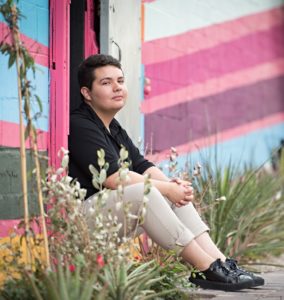 Eventually we have to ask ourselves, “Why are we afraid of mental health?”
Eventually we have to ask ourselves, “Why are we afraid of mental health?”
As my high school experience came to an end, I found myself in the middle of a revolutionary path toward understanding and normalizing mental health. It is so common to avoid mental health in everyday conversations. It’s treated like something that – almost – doesn’t exist. Some might say “If it ain’t broke, don’t fix it.” This cliché summarizes how too many of us view mental health – that the status quo is good enough – and it allows us to remain silent. But the status quo isn’t good enough and we need to talk about mental health.
That leads to the question I first asked: Why are we afraid of mental health?
The teen Mental Health First Aid (tMHFA) program changed the conversation for me and my peers this year. The program brought the topic of mental health to the ENTIRE senior class at Valley High School in Las Vegas, and equipped students with the ability and tools to not only recognize warning signs, but take the proper steps to help someone in a mental health crisis. It engaged students in discussions about mental health that we never had before and helped us understand what a crisis is and how to help.
tMHFA gave us real-life examples of what mental health challenges and crises look like, what those who are struggling go through and the ways depression or anxiety can be crippling to a person’s normal function. This was new information for many students, who came to the training with little to no information about what challenges like depression and anxiety can do to a person’s overall persona.
It was information we were able to use immediately to help those around us. Soon after finishing the training, I was talking to a friend and with the help of tMHFA, I recognized the warning signs of depression. I put the tMHFA Action Plan into play and tried to break through the discomfort of talking about mental health by asking a seemingly easy, yet impossible, question: “Are you thinking about killing yourself?” It was a really loaded question to ask on a Saturday afternoon, but something that needed to be said. I was able to help my friend get in touch with a trusted adult and get needed help.
That conversation might have been the hardest thing I ever had to do. It’s also something I can’t imagine doing without tMHFA training. Thanks to the course, I had the tools to help someone who was really in need and the confidence to have the difficult and uncomfortable conversation. Now, I can keep having conversations about mental health with my peers and can keep trying to break down the invisible barrier around mental health. As a graduate of the tMHFA program, I have seen first-hand the importance of this training and the necessity of its expansion across the nation.
This program has changed my life and will forever impact me. And as it continues to expand across the country, I know that we can be the generation that remove the fear of mental health and come into a world where it is real, valid and manageable.
Learn more about Mental Health First Aid and take a course today.